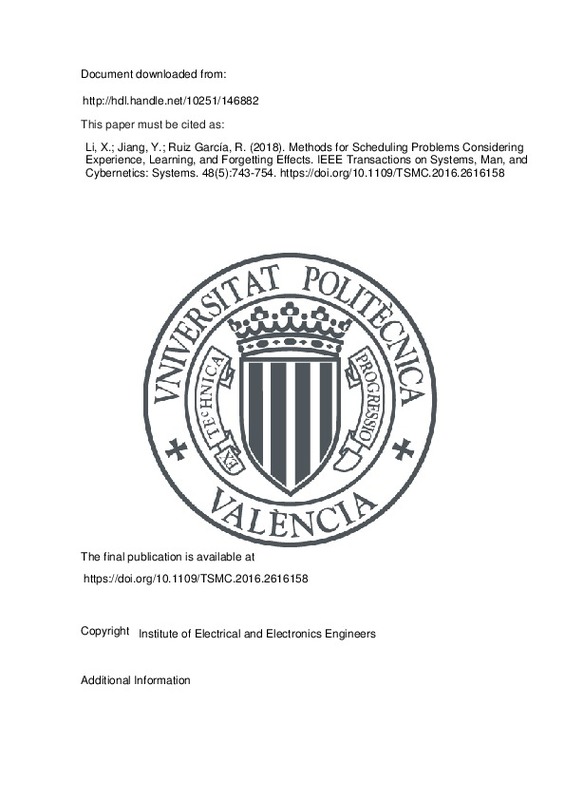JavaScript is disabled for your browser. Some features of this site may not work without it.
Buscar en RiuNet
Listar
Mi cuenta
Estadísticas
Ayuda RiuNet
Admin. UPV
Methods for Scheduling Problems Considering Experience, Learning, and Forgetting Effects
Mostrar el registro sencillo del ítem
Ficheros en el ítem
| dc.contributor.author | Li, Xiaoping
|
es_ES |
| dc.contributor.author | Jiang, Y.
|
es_ES |
| dc.contributor.author | Ruiz García, Rubén
|
es_ES |
| dc.date.accessioned | 2020-06-24T03:31:38Z | |
| dc.date.available | 2020-06-24T03:31:38Z | |
| dc.date.issued | 2018-05 | es_ES |
| dc.identifier.issn | 2168-2216 | es_ES |
| dc.identifier.uri | http://hdl.handle.net/10251/146882 | |
| dc.description.abstract | [EN] Workers with different levels of experience and knowledge have different effects on job processing times. By taking into account 1) the sum-of-processing-time; 2) the job-position; and 3) the experience of workers, a more general learning model is introduced for scheduling problems. We show that this model generalizes existing ones and brings the consideration of learning and forgetting effects closer to reality. We demonstrate that some single machine scheduling problems are polynomially solvable under this general model. Considering the forgetting effect caused by the idle time on the second machine, we construct a learning-forgetting model for the two-machine permutation flow shop scheduling problem with makespan minimization. A branch-and-bound method and four heuristics are presented to find optimal and approximate solutions, respectively. The proposed heuristics are evaluated over a large number of randomly generated instances. Experimental results show that the proposed heuristics are effective and efficient. | es_ES |
| dc.description.sponsorship | This work was supported in part by the National Natural Science Foundation of China under Grant 61572127 and Grant 61272377, in part by the Key Research and Development Program in Jiangsu Province under Grant BE2015728, in part by the Collaborative Innovation Center of Wireless Communications Technology and the Key Natural Science Fund for Colleges and Universities in Jiangsu Province under Grant 12KJA630001, and in part by the Collaborative Innovation Center of Wireless Communications Technology. The work of R. Ruiz was supported by the Spanish Ministry of Economy and Competitiveness through Project "SCHEYARD-Optimization of Scheduling Problems in Container Yards" under Grant DPI2015-65895-R. This paper was recommended by Associate Editor A. Janiak. | es_ES |
| dc.language | Inglés | es_ES |
| dc.publisher | Institute of Electrical and Electronics Engineers | es_ES |
| dc.relation.ispartof | IEEE Transactions on Systems, Man, and Cybernetics: Systems | es_ES |
| dc.rights | Reserva de todos los derechos | es_ES |
| dc.subject | Flowshop | es_ES |
| dc.subject | Forgetting effect | es_ES |
| dc.subject | Learning effect | es_ES |
| dc.subject | Scheduling | es_ES |
| dc.subject.classification | ESTADISTICA E INVESTIGACION OPERATIVA | es_ES |
| dc.title | Methods for Scheduling Problems Considering Experience, Learning, and Forgetting Effects | es_ES |
| dc.type | Artículo | es_ES |
| dc.identifier.doi | 10.1109/TSMC.2016.2616158 | es_ES |
| dc.relation.projectID | info:eu-repo/grantAgreement/NSFC//61572127/ | es_ES |
| dc.relation.projectID | info:eu-repo/grantAgreement/NSFC//61272377/ | es_ES |
| dc.relation.projectID | info:eu-repo/grantAgreement/Jiangsu Province Key Natural Science Fund for Colleges and Universities//12KJA630001/ | es_ES |
| dc.relation.projectID | info:eu-repo/grantAgreement/MINECO//DPI2015-65895-R/ES/OPTIMIZATION OF SCHEDULING PROBLEMS IN CONTAINER YARDS/ | es_ES |
| dc.rights.accessRights | Abierto | es_ES |
| dc.contributor.affiliation | Universitat Politècnica de València. Departamento de Estadística e Investigación Operativa Aplicadas y Calidad - Departament d'Estadística i Investigació Operativa Aplicades i Qualitat | es_ES |
| dc.description.bibliographicCitation | Li, X.; Jiang, Y.; Ruiz García, R. (2018). Methods for Scheduling Problems Considering Experience, Learning, and Forgetting Effects. IEEE Transactions on Systems, Man, and Cybernetics: Systems. 48(5):743-754. https://doi.org/10.1109/TSMC.2016.2616158 | es_ES |
| dc.description.accrualMethod | S | es_ES |
| dc.relation.publisherversion | https://doi.org/10.1109/TSMC.2016.2616158 | es_ES |
| dc.description.upvformatpinicio | 743 | es_ES |
| dc.description.upvformatpfin | 754 | es_ES |
| dc.type.version | info:eu-repo/semantics/publishedVersion | es_ES |
| dc.description.volume | 48 | es_ES |
| dc.description.issue | 5 | es_ES |
| dc.relation.pasarela | S\383628 | es_ES |
| dc.contributor.funder | National Natural Science Foundation of China | es_ES |
| dc.contributor.funder | Jiangsu Province Key Natural Science Fund for Colleges and Universities, China | es_ES |
| dc.contributor.funder | Ministerio de Economía y Competitividad | es_ES |







![[Cerrado]](/themes/UPV/images/candado.png)

